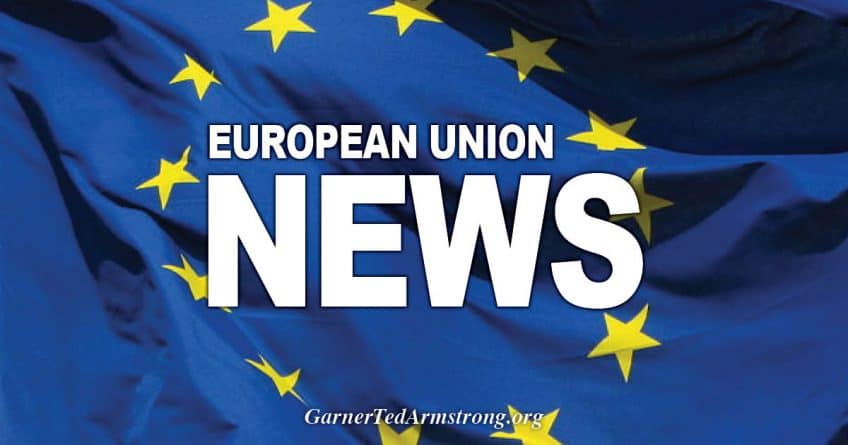
Secretary of State Rex Tillerson and European Union foreign policy chief Federica Mogherini address a joint news conference at the European Council in Brussels on Tuesday. (Francois Lenoir/Reuters)
BRUSSELS — Secretary of State Rex Tillerson’s trip to Europe, normally friendly territory, is underscoring the difficulties of defending Trump administration policies to skeptical allies and his own, much criticized management of the State Department.
Federica Mogherini, the foreign policy chief of the European Union, struck one of the first blows when on Tuesday she offered a strikingly unvarnished critique of two key administration policies. Standing beside Tillerson, she told reporters it would be unwise for the United States to back away from the Iran nuclear deal and suggested that moving the U.S. Embassy in Israel to Jerusalem would undermine Middle East peace efforts.
Tillerson also is facing criticism from within. At a routine meet-and-greet event with employees of the U.S. Embassy in Brussels, he defended administration policies and his own performance. He deviated from his standard speech outline to say that the State Department under his helm is “not missing a beat.” Moments later, he acknowledged a lack of major diplomatic successes, although he insisted that the groundwork has been laid.
“While we don’t have any wins on the board yet, I can tell you we’re in a much better position to advance America’s interests around the world than we were 10 months ago,” he said.
Increasingly, allies do not share that assessment. Tillerson is receiving a chilly, judgmental reception in Europe, startling for a diplomat representing a country that considers itself the leader of democracies with shared values and principles.

Secretary of State Rex Tillerson (fourth from left), German Foreign Minister Sigmar Gabriel (second from right) and French Foreign Minister Jean-Yves Le Drian (third from right) attend a meeting at the NATO headquarters in Brussels on Tuesday. (Virginia Mayo/AFP/Getty Images)
Shortly after Tillerson arrived in Brussels, he was followed by a line of foreign ministers who uttered their disapproval.
Not long ago, it would have been rare for European allies to lay bare their differences so starkly. Tuesday’s criticisms were a measure of Europe’s diminished respect for the United States — and also the political benefits of hitting President Trump in front of European audiences that are deeply skeptical of the U.S. leader.
One after another, the top diplomats of Belgium, Germany and Luxembourg enumerated their disagreements about the Iran deal and Trump’s possible recognition of Jerusalem as Israel’s capital.
“That’s oil on the fire,” Luxembourg Foreign Minister Jean Asselborn said as he walked into a meeting with Tillerson alongside other E.U. foreign ministers, referring to his government’s view about the consequence of recognizing Jerusalem. Belgian Foreign Minister Didier Reynders urged avoiding “any provocation” that might ensue.
[Trump policies starting to ‘crumble’ traditional U.S.-Europe ties, German foreign minister warns]
German Foreign Minister Sigmar Gabriel echoed the worry, hours after delivering a searing speech in Berlin that offered a deeply pessimistic view of the future of U.S.-German relations.
“The current U.S. withdrawal under Trump from its role as the reliable guarantor of Western multilateralism accelerates the change in the global order,” Gabriel said at the Körber Foundation in Berlin. The pullback “will not change fundamentally even after the next election.”
R.C. Hammond, a senior aide to Tillerson, said NATO Secretary General Jens Stoltenberg disagreed with Gabriel’s assertion during a meeting with Tillerson that the European Union can go it alone. He said Stoltenberg told Tillerson that NATO depends on U.S. and British contributions to cover its military expenses.
Hammond also disputed the characterization that Tillerson’s counterparts showed any frostiness.
“That sounds like partners in communication,” he said of the public differences enumerated by diplomats.
“Allies have been very frank today in sharing some of their views,” he added. “Dialogues only work if they go two ways.”
Complicating his task, Tillerson arrived in Brussels, his first stop on a three-country trip, with his authority to speak for the administration under assault.
Last week, after months of mounting criticism that Tillerson’s remote management style and personnel decisions were gutting the State Department, White House officials let it be known that his tenure may be ending in a matter of weeks. The White House later denied wanting to get rid of Tillerson, and Tillerson himself dismissed the reports as “laughable.”
[White House readies plan to replace Tillerson with Pompeo at State, install Cotton at CIA]
Tillerson publicly appeared unruffled about the speculation about his political demise. He ignored a shouted question about whether he still speaks for the president. But the underlying discontent about his stewardship shadowed Tillerson throughout the day.
In his remarks to embassy staff members, a standard event designed to show appreciation for their work, the former chief executive of ExxonMobil suggested that he is nettled by downcast assessments of a State Department diminished under his leadership.
“We’re still awaiting a lot of nominees to clear the processes and be confirmed,” he said, referring to dozens of senior positions that are being filled temporarily by officials assuming “acting” roles. “I get a little criticism for that from time to time.”
Tillerson praised the staff members who have been pressed into duty running bureaus for the past 10 months, and said, “The State Department is not missing a beat, because we’re still working through the process.”
He told the assembled employees that within the next few weeks he will announce some of the changes expected by his State Department reorganization effort — “which everyone seems to be an expert on,” he added wryly.
Heading over to the European Union offices for talks with Mogherini and a lunch of duckling breast, Tillerson looked unfazed as Mogherini castigated Trump’s policies on Iran and the Israeli-Palestinian conflict.
[Disclaimer]









